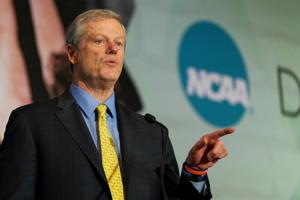
News
October 23, 2025
NCAA allows college athletes to bet on professional sports starting Nov. 1
The NCAA approved a rule change on Wednesday that will allow athletes and athletic department staff members to bet on professional sports.
**College Athletes Now Allowed to Bet on Pros, NCAA Announces**
In a significant shift in policy, the National Collegiate Athletic Association (NCAA) announced Wednesday that college athletes and athletic department staff will be permitted to wager on professional sports, effective November 1st. The decision marks a departure from the NCAA’s previously stringent stance against all forms of sports betting involving anyone connected to college athletics.
The rule change, approved after a lengthy period of deliberation, aims to modernize the NCAA's approach to gambling regulations in light of the evolving landscape of legalized sports betting across the United States. While previously, any involvement in sports wagering could lead to penalties, including ineligibility for athletes, the new guidelines carve out an exception for betting on professional leagues.
However, the NCAA is keen to emphasize that the ban on betting on college sports remains firmly in place. Student-athletes, coaches, and athletic department personnel are still strictly prohibited from wagering on any collegiate sporting event, regardless of the division or conference. The NCAA views this distinction as crucial in safeguarding the integrity of college competition and preventing potential conflicts of interest.
"Maintaining the integrity of college sports is paramount," a statement released by the NCAA emphasized. "This rule change allows for a degree of personal freedom regarding professional sports wagering, but the prohibition on betting on college athletics remains absolute."
The decision is likely to be met with mixed reactions. Some will applaud the NCAA for adapting to the changing times and recognizing the increased accessibility of sports betting. Others may express concerns about the potential for the line between professional and collegiate sports to become blurred, raising questions about the long-term implications for the integrity of amateur athletics.
The NCAA has stated that it will be providing comprehensive educational resources to student-athletes and staff members regarding the new rules and the importance of responsible gaming. These resources will aim to help individuals understand the guidelines clearly and avoid any inadvertent violations that could jeopardize their eligibility or careers. As November 1st approaches, all eyes will be on how this new policy unfolds and its impact on the world of college sports.
In a significant shift in policy, the National Collegiate Athletic Association (NCAA) announced Wednesday that college athletes and athletic department staff will be permitted to wager on professional sports, effective November 1st. The decision marks a departure from the NCAA’s previously stringent stance against all forms of sports betting involving anyone connected to college athletics.
The rule change, approved after a lengthy period of deliberation, aims to modernize the NCAA's approach to gambling regulations in light of the evolving landscape of legalized sports betting across the United States. While previously, any involvement in sports wagering could lead to penalties, including ineligibility for athletes, the new guidelines carve out an exception for betting on professional leagues.
However, the NCAA is keen to emphasize that the ban on betting on college sports remains firmly in place. Student-athletes, coaches, and athletic department personnel are still strictly prohibited from wagering on any collegiate sporting event, regardless of the division or conference. The NCAA views this distinction as crucial in safeguarding the integrity of college competition and preventing potential conflicts of interest.
"Maintaining the integrity of college sports is paramount," a statement released by the NCAA emphasized. "This rule change allows for a degree of personal freedom regarding professional sports wagering, but the prohibition on betting on college athletics remains absolute."
The decision is likely to be met with mixed reactions. Some will applaud the NCAA for adapting to the changing times and recognizing the increased accessibility of sports betting. Others may express concerns about the potential for the line between professional and collegiate sports to become blurred, raising questions about the long-term implications for the integrity of amateur athletics.
The NCAA has stated that it will be providing comprehensive educational resources to student-athletes and staff members regarding the new rules and the importance of responsible gaming. These resources will aim to help individuals understand the guidelines clearly and avoid any inadvertent violations that could jeopardize their eligibility or careers. As November 1st approaches, all eyes will be on how this new policy unfolds and its impact on the world of college sports.
Category:
World